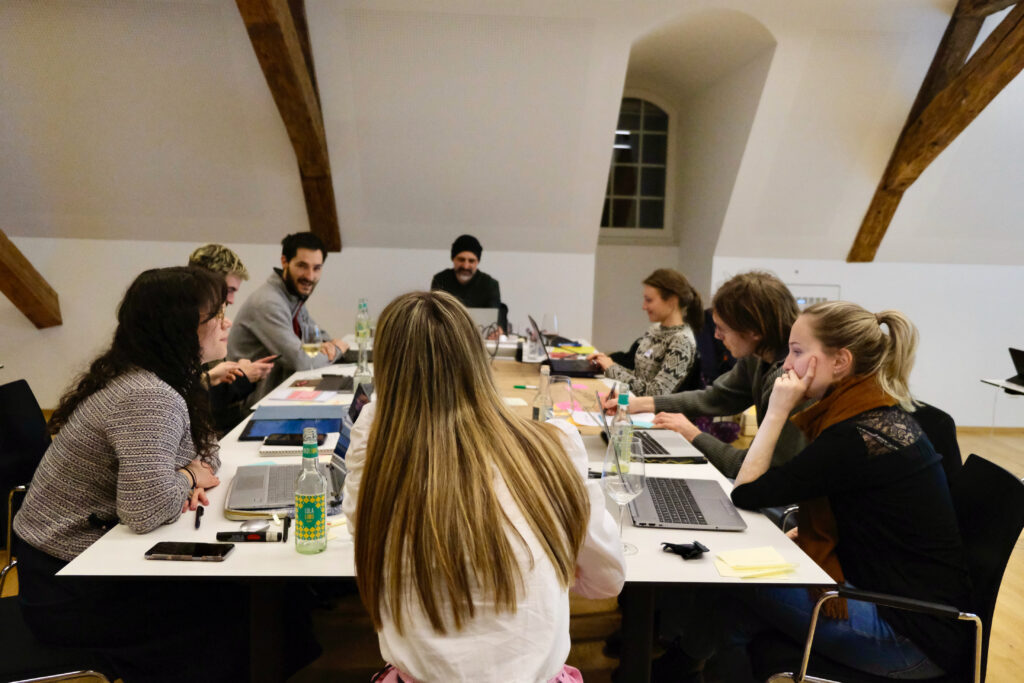This blog has been written by a group of young authors from a variety of academic backgrounds who were brought together by the Hirschmann grant program for students excelling in their studies at Swiss Universities of Applied Sciences. The grant holders worked on a future oriented topic of their choice, namely their generation’s attitudes towards political activism and societal change. The present blog post is part of a four blog series resulting from an interactive workshop and a participatory redaction phase on Policy Kitchen, during which the grand holders were accompanied by foraus. This blog is about the day of a young student. The reader gets an insight into her thought processes and actions and thereby inviting him to reflect upon the smaller and bigger democracy moments one might experience in a day.
Alicia wakes up with the instinct to glance at her cell phone and browse social networks. Her eyes have a hard time waking up, but the excitement of learning more about her friends‘ daily lives and their crazy adventures helps. Alicia is delighted by a photo of her best friend at a sunny beach, impressed by the sporting prowess of her favorite volleyball team, and horrified at a new broadcast about the war in Ukraine. Only minutes after waking up this already makes her wonder for the first time: what kind of world does she live in? As a student countries away, could she even get personally involved? What can she do to show solidarity with the refugees fleeing from war-torn Ukraine?
After some more scrolling, Alicia gets up and joins her family’s breakfast. Her younger brother is boiling water in the pot without using a lid again. In a grumpy morning voice Alicia snarks: „Ever heard of saving electricity?“. He murmurs, „It’s useless anyway.“ Alicia is outraged. Why does her usually eco-conscious family let such a statement stand in the room? But also Alicia remains silent because she has learned that nothing good comes out of starting a debate at breakfast. Normally she likes to get involved in discussions and is good at handling disagreements. Enduring adverse opinions, taking time to understand other’s arguments and separating the personal relationship from topical disagreements are important to her. Alicia is determined not to shy away from discussion a second time today.
With this plan in her head she gets ready to go to university. Taking the train she notices all the faces of the people illuminated by their smartphones. Alicia sits down, peeking at the sole woman still thoughtfully looking out of the window holding a newspaper in her hands. What might she be thinking about? Their eyes cross briefly and, remembering her plan from breakfast, she summons her courage and asks the woman what is on her mind. Surprised but smiling, the woman tells her about an article she had read in the magazine about the upcoming energy shortage. They begin to discuss the topic together and after a while a second stranger joins the conversation. Alicia is determined to leave her comfort zone more often in the future.
At uni, she pushes through the tough morning lectures and afterwards goes to her book club. For today the quirky group of seven has read Elliot Liebow’s Tell Them Who I Am: The Lives of Homeless Women. The discussion quickly moves beyond the text. They animatedly deliberate ways to better support socioeconomically disadvantaged people in Switzerland. The new kid in the group, Tom, proposes that cities should offer individuals without a permanent residence to take on community tasks in exchange for benefits and the idea to transition into a permanent position after some time. Ben, a teacher, agrees that the idea sounds profitable for everyone. The discussion goes on for a long time, Alicia’s tea gets cold as a storm of different ideas are discussed. While at times fuming silently, she manages to listen patiently to fundamentally opposing ways of thinking. Alicia is positively surprised that her subsequent criticism is also listened to without prejudice. Her head still in thoughts, Alicia makes her way home.
When lying in bed at night, Alicia thinks back to this morning, when she felt so far away from politics. In small moments sprinkled throughout her day, she has managed to start meaningful exchanges and make her voice heard. Alicia is proud to have left her personal comfort zone to address a stranger, to have spoken up and disagreed at the book club. Let us all consciously take in and grasp the small moments of politics and community in our daily lives. Doing so, we can become more aware of societal and political relevant topics and develop our own, unique approaches to civic action in the 21st century.




